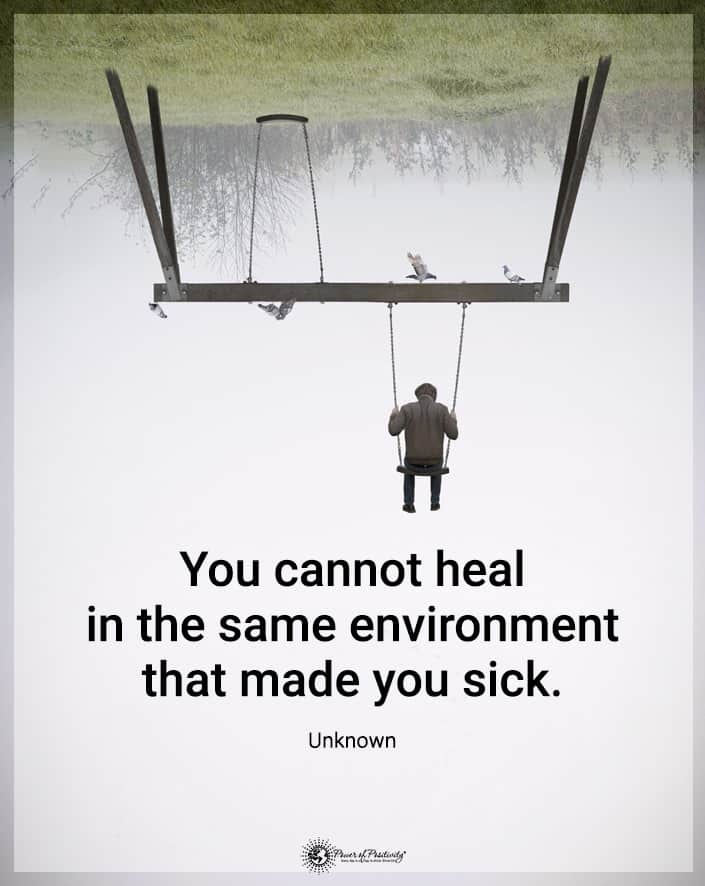How do you cope with difficult situations, sensations, feelings, and thoughts? Do you do your best to process and handle these events well? Or do you turn to unhealthy coping mechanisms that turn out to make matters worse?
If you’ve noticed that the ways you cope aren’t particularly productive, it may be time to alter them. Proper coping strategies should be helping you, not making things worse. But how can you tell if you’re coping poorly, and what can you do about it? Here are three unhealthy coping mechanisms and how to change them.
Unhealthy Coping Mechanisms: Separating Yourself From Reality
Reality is important because it’s, well, real! But sometimes, reality comes with negative truths and facts that can cause mental and emotional stress. This behavior can lead some people to adopt unhealthy coping mechanisms that attempt to separate them from reality. These coping strategies may involve:
· Repression or Denial
Denial and repression are both unhealthy coping mechanisms that come from the same cloth. They involve refusing to acknowledge the truth of a situation to create a false sense of security. You don’t want to accept reality, so you insist that what’s happening isn’t real. You revise your beliefs into the desired reality, creating fantasies that elevate your idea of yourself, the world, and your situation. Some people also do this to meet expectations, especially when it comes to repressing or denying emotion. For example, you might decide to pretend that you’re okay so that no one judges you or uses that against you.
 · Dissociation
· Dissociation
Dissociation is an inability to express certain parts of personal experiences. This behavior often involves separating your awareness from the reality of your emotions, thoughts, and feelings. It’s most commonly invoked automatically as one of the brain’s subconscious coping strategies for extreme trauma. You don’t remember what happened, so it can’t hurt you. However, this is nothing more than a survival mechanism to get you through the moment. To heal from trauma, research indicates that you have to live through it and experience it.
· Toxic Positivity (one of the overlooked unhealthy coping mechanisms)
Positivity is a good thing, and on its own, it’s one of the better coping strategies for various challenging situations. But there’s a point where it can be taken too far, and that’s how you get toxic positivity. This habit involves the act of avoiding anything and everything that is even slightly negative. It can also include refusing to acknowledge or experience negative emotions, thus interfering with repression and denial. Forcing positivity instead of realistic optimism can be highly detrimental, separating you from reality and causing bottled-up negative emotions.
· Romanticization Of Past Events (one of the most unhealthy coping mechanisms)
When you’re in transitional phases in your life, it’s tempting to look back and romanticize the past. You look at what you went through with nostalgia-filled rose-colored glasses, glossing over all the negative things you left behind. This makes you long for a more comfortable past, so you can’t look to the future with positivity.
To stop separating yourself from reality, you have to find value in admitting to the truth. There has to be a point where you realize that a refusal to accept fact prevents you from moving forward. Learning better ways to cope with reality can also prevent you from needing to separate yourself from it. You can work on changing this poor coping skill in the following ways:
· Get In Touch With Your Subconscious
Talk to yourself regularly and ask how you’re feeling. Openly speak to yourself about what you think and how different events have affected you. Remind yourself that it’s okay to feel whatever you think and ask yourself deep and probing questions. Whenever something challenging happens, spend more time speaking to your subconscious and understanding how it feels.
· Practice Mindfulness
Mindfulness is an excellent tool for maintaining groundedness. Its concept is simple: you have to be present and aware of your thoughts, feelings, and sensations. However, those experiences shouldn’t define or control you, nor should you try to manage them. All you need to do is be their witness, acknowledge them, and let them pass so you can process what remains. Studies find mindfulness to help cope with anxiety and cope with depression.
· Keep A Journal
A journal is a safe space where you can write about anything under the sun without judgment. Keeping a journal can let you note and process painful emotions, grounding them in reality while allowing healthy expression. Research indicates that journaling can improve mental health!
Do note that separation from reality that stems from severe trauma requires professional assistance.
Unhealthy Coping Mechanisms: Self-Medicating
Self-medicating is the act of treating emotional or mental distress, discomfort, and pain with something that quickly makes you feel better. While it can be done healthily, many people turn to very negative forms of this behavior. Unhealthy self-medicating may involve:
· Food
Emotional eating is one of the most common unhealthy coping mechanisms. Releasing temporary feel-good hormones from fatty, sugary, and fried foods often serve as a “balm” in emotional distress. This pattern causes an unhealthy relationship with food and can lead to food and eating disorders. It may also work in the opposite way, where one self-medicates by starving themselves to feel better about their appearance.
· Alcohol
Alcohol’s nickname, “liquid courage,” can lead it to be an attractive option for self-medication for many people. Research shows that those who self-medicate with alcohol may do so to avoid feeling powerless or helpless. This consumption leads to addiction, which is often further handled with additional unhealthy coping mechanisms, such as denial.
· Drugs
Like alcohol, drugs provide an effect that can be alluring to those seeking any method of coping with depression, anxiety, or other turmoil. They can make you feel more confident and energized at the moment, though the aftereffects make that counterproductive. Again, as with alcohol, this can lead to addiction and further bad coping strategies.
· Media Consumption (one of the unhealthy coping mechanisms that traps you quickly!)
“Binge-watching” is a common term in these modern times, and it’s a more realistic term than you may think. Consuming media, whether TV, movies, books, comics, or music, can be a form of self-medication. This method of escapism ties in with a separation from reality. You don’t want to live in your world, so you seek an alternative one in fantasy. This habit can also happen via mindless social media scrolling.
· Spending
Purchasing items creates a temporary release of feel-good hormones like dopamine. The acquisition of products to improve emotional state even has its term: retail therapy. This can cause financial stress and lead to numerous unnecessary purchases that don’t provide long-term value when taken to an extreme. It can even become addictive.
If you’d like to change unhealthy coping mechanisms of self-medicating, you need to replace the “medication” with something good. Here are some ways to alter this behavior:
 · Find The Root Of Urges
· Find The Root Of Urges
The urge to self-medicate is often a mindless one. When you feel the desire to perform unhealthy coping mechanisms of self-medication, take a pause. Ask yourself why you think this way and trace the root. Once you find the source, acknowledge it, accept it, and redirect your attention to something that handles it specifically. It may be helpful to use the tips to ground yourself and prevent separation from reality.
· Exercise
A lot of the positive hormone rushes that you get from self-medication can be found in exercise. Exercising releases many different forms of productive hormones and makes you feel good about yourself. This covers lots of bases that are filled by self-medicating.
· Participate In Hobbies
Engaging in hobbies is a commonly referenced way to avoid harmful self-medicating behaviors. Like exercise, hobbies make you feel good and give you the mood and confidence boost associated with toxic substances. You’ll also build skills, feel more accomplished, and be more productive as a result.
· Get Enough Sleep
A lack of sleep can increase the desire to self-medicate. You’re tired, less resilient, and more susceptible to emotional stress when you’re not getting the rest you need. Make sure you sleep for at least 7 hours each day. Feeling restored and energized can prevent the desire to self-medicate or binge excessively.
Do note that many self-medicating problems require professional treatment, especially if they involve addictive substances.
Unhealthy Coping Mechanisms: Social Negativity
Socially negative behaviors are common unhealthy coping mechanisms. They involve behavior that makes you interact with others in a harmful or toxic way to cope with your feelings. You might do this through:
· Projection (an unhealthy coping mechanism most people don’t consider)
When you experience negative thoughts or feelings, you may be ashamed of them if they’re less “nice.” For example, if you think you’re behaving selfishly, you may feel uncomfortable admitting that to yourself. Or, if you worry you lack the capability, you might not want to think about that at all. This makes you project those feelings and thoughts onto others. Projection is the act of transferring your emotions and thoughts onto someone else and making yourself believe that they’re to blame. For example, you might say, “That person’s the one who’s selfish, not me!” or something along those lines. This thinking distracts you from your accountability in that matter.
· Isolation
When you’re overwhelmed by adverse events or emotions, you might want to withdraw from everyone else. Other people might force you to confront your feelings, or it could just make you more tired. So you separate yourself from others, severing connections. But human beings require regular social interaction to flourish, even if it’s just a little. Isolating yourself will only make you feel worse and will rob you of crucial social support. It also makes you more likely to continue that isolation.
· Refusing Assistance
If you’re a perfectionist, you may believe that your efforts are only valuable if you do them entirely unassisted. Even when stress gets to you, and you feel exhausted, you refuse all help from others. This stubborn action causes you to become even more fatigued, ultimately resulting in burnout.
· Downward Comparison
To manage issues stemming from low self-esteem, you may perform comparisons of yourself with others. Instead of looking upwards to find inspiration, you seek those you can look down on. You tell yourself that at least you’re not as bad as they are. Unfortunately, this only reinforces feelings of inferiority and doesn’t make you feel better. Plus, it’s pretty mean to do.
If social negativity is among your unhealthy coping mechanisms, it’s not usually others who are at fault. To change those coping strategies, you have to start with yourself. You can do so by:
· Building Self-Confidence
Many actions of social negativity stem from poor self-esteem. You wouldn’t project, compare, isolate, or refuse help if you believed in your capabilities! Building self-confidence is a long, arduous task, but you can start by countering negative self-talk with positive affirmations. When your inner critic says something mean about you, silence it with facts about your strengths and abilities.
· Surrounding Yourself With Positive People
An excellent social circle can help you to feel welcomed, safe, and uplifted. The people around you should be a source of encouragement, not unhealthy or toxic competition. They can also provide you with an open ear and a shoulder to cry on while increasing your sense of belonging!
· Embracing A Growth Mindset Instead of Unhealthy Coping Mechanisms
A growth mindset is the opposite of a scarcity mindset. It believes that everyone has an infinite capacity for personal growth and that each moment can teach a positive lesson. Instead of thinking that you’re running a race or contest against others, think only of your journey. Your mistakes aren’t a sign of failure or shame because you’re doing “worse” than others. These mistakes are merely lessons that you can use to grow and be better!
Do note that you may need professional assistance if you have social anxiety or other disorders that affect social behavior.
 Final Thoughts On Some Unhealthy Coping Mechanisms And How To Change Them
Final Thoughts On Some Unhealthy Coping Mechanisms And How To Change Them
Everyone has a few unhealthy coping mechanisms on their plate. Some are more harmful than others, but all of them can be changed. Understanding where your unhealthy coping mechanisms stem from and what those strategies are is an important step. Once you do that, you can work on changing them.


















